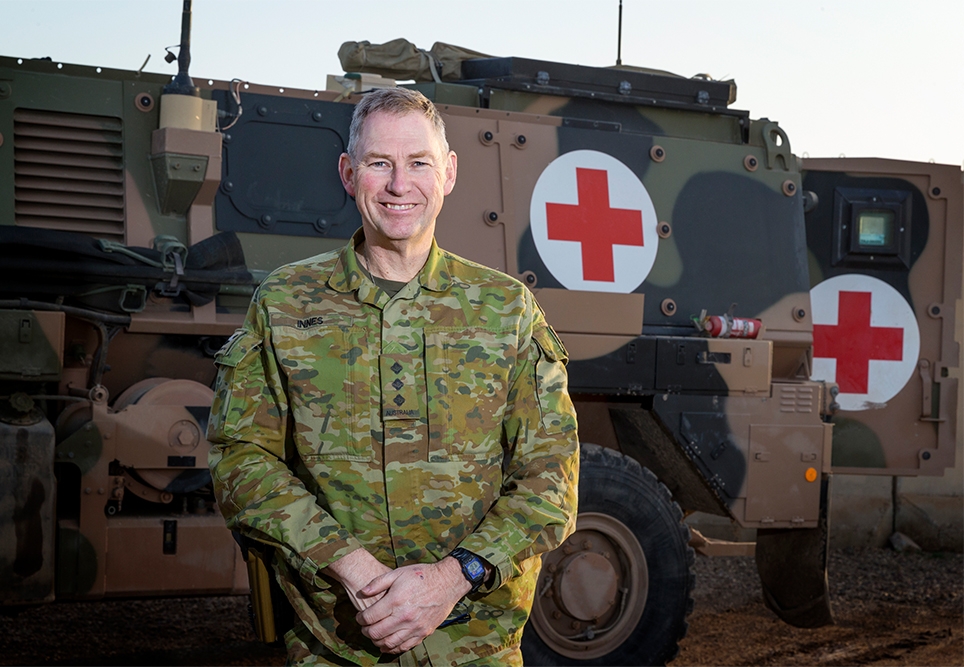This site may not work properly using older versions of Edge and Internet Explorer. You should upgrade your browser to the latest Chrome, Firefox, Edge, Safari, or any other modern browser of your choice. Click here for more information.
Your Stories
This is where we tell your stories, cover topical issues and promote meaningful initiatives.
Lessons from a life of service with David Innes
Registered Nurse David Innes finds many similarities between his nursing life as an Army Reserve Nursing Officer and the life of remote nurses in Australia. Here he talks about his life in the military as he lists those similarities.
A phone call in November 1994, three days before his wedding, asking Army Reserve Nursing Officer David Innes to join a mission in Rwanda was a once-in-a-lifetime opportunity. Or so he and his wife-to-be thought.
So, six weeks after getting married, David left for a nine-month deployment with Australia’s military contribution to the UN Assistance Mission on Operation TAMAR.
It was the tail end of genocide and civil war in Rwanda and the country was in desperate need – its infrastructure destroyed, its people displaced, and thousands of orphans left in the wake of the genocide.
David, a Major in the Australian Army, has since served overseas in places like Timor Leste, Solomon Islands, Banda Aceh and Iraq. Within Australia, his deployments to remote communities in the Northern Territory have included Katherine and Tiwi Islands, and the Victorian bushfires.
Remote nursing, David observes, mirrors many aspects of his stints as a military nurse. Whether serving in Rwanda, Aceh after the tsunami, or remote Australia, he found himself in situations where resources were scarce, infrastructure was minimal, teamwork was essential and self-sufficiency was key.
“For remote nurses, I have seen how difficult their conditions are,” he says. “It is hot, they are in the middle of nowhere, they face the unexpected and they deal with it,” he says.
“It attracts a particular type of person and I hold them in high regard.”
David’s nursing career began in 1984 in Melbourne before he moved to South Australia for postgraduate studies. There, a friend introduced him to the Army Reserve.
“I loved the Army Reserve, learning about field medicine,” he says.
“As a nurse, you bring your medical skills and expertise to the situation, while the Defence experience teaches you about leadership, team work and resilience. Win – win.”
David sees five key values shared between Defence and remote nursing: striving for excellence, service, respect, courage and integrity.
“Whether in a combat zone or an isolated clinic, nurses strive to deliver the highest level of care. In remote settings, they must be resourceful and adaptable, often acting as the sole clinician on-site,” says David.
“Working alone in a remote community requires the same resilience as being deployed in an austere environment.
“Nurses must make critical time-sensitive decisions with limited backup, often relying on a single line of communication for support.
“And, in extreme situations, integrity is crucial. Whether treating a critically ill patient in an ambulance or managing a public health crisis in an isolated community, nurses must rely on their training, experience, and ethical judgment.”
Since Rwanda, David has balanced his military career, nursing and his work with Ambulance Victoria, where he continues to work as a Mobile Intensive Care Ambulance (MICA) paramedic.
These people are highly trained medical professionals who can perform advanced medical procedures, working in ambulances to provide hospital-level care to patients in their homes, workplaces, and on the streets.
“I have seen firsthand the benefits of the Army Reserve to both Defence and civilian medicine,” says David.
“Defence medical personnel, from ICU nurses to cardiothoracic surgeons, refine their skills in high-stakes environments,” he says, “taking that expertise back to their civilian jobs. Likewise, the military benefits from the advanced clinical skills and innovation developed in hospitals. It’s a mutually beneficial relationship that enhances the quality of care in both domains.”
Self-sufficiency is a key attribute shared by military medical personnel and remote nurses, says David.
“The ability to problem-solve under pressure, adapt quickly, and remain calm in adversity is what makes both military medical personnel and remote nurses highly capable professionals.”
David believes that nursing – whether in a warzone, an outback clinic, or a metropolitan hospital – demands a commitment to service. The Royal Australian Army Nursing Corps motto, For Humanity, encapsulates the selflessness required in both military and remote health care, he says.
Life continues to be full of action for David. This interview was the morning after a 16-hour shift treating a critically unwell patient who needed to be accompanied to hospital an hour away.
“It happened at the end of my shift – but you can’t just down tools,” he says. “It’s not that uncommon. It’s the nature of the job.”
His final comment: “You are always capable of so much more. You think you have reached the limit of what you are capable of. You always have more to give. Nurses are brilliant at that. They face challenges, learn lessons and apply them. You end up with this amazing ability to meet challenges and work your way through them.”
